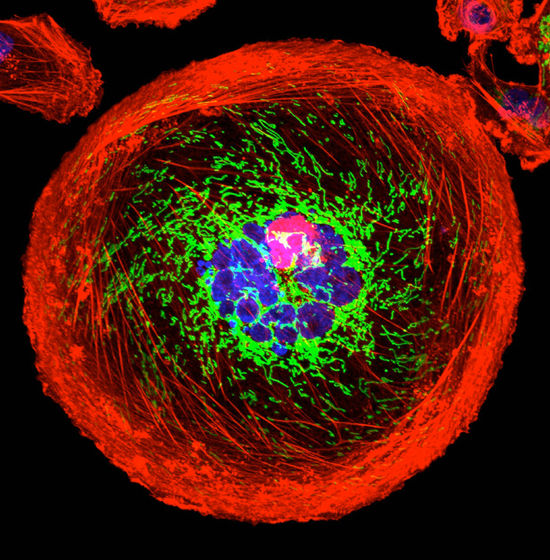Research shows that ancient viruses sleeping in DNA are 'awakened' in cancer cells, which could be applied to cancer treatment

It is said that about 8% of human genes are '
Endogenous retroviruses mediate transcriptional rewiring in response to oncogenic signaling in colorectal cancer | Science Advances
https://www.science.org/doi/10.1126/sciadv.ado1218
Ancient viruses fuel modern-day cancers | CU Boulder Today | University of Colorado Boulder
https://www.colorado.edu/today/2024/07/17/ancient-viruses-fuel-modern-day-cancers
According to Edward Truong, a genome biologist at the BioFrontier Institute at the University of Colorado Boulder, endogenous retroviruses that remain in genes do not have the ability to create new viruses, but they do function as switches to turn on the expression of nearby genes, some of which contribute to important functions in modern humans, such as the development of the placenta and the immune response to COVID-19.
There is a lot of research being done on the benefits of these endogenous retroviruses, but not much research on the harms they pose to the human body.
To investigate how endogenous retroviruses affect cancer, which accounts for one-sixth of global deaths, Truong and his team extracted and analyzed genomic data for 21 types of cancer from publicly available datasets.
The team found that the gene LTR10, left behind by a virus that infected some primates about 30 million years ago, showed surprisingly high levels of activity in several types of cancer, including lung and colorectal cancer. Furthermore, when they analyzed tumors from patients with colorectal cancer, they found that LTR10 was activated in one-third of the patients.

In a test experiment, the team used the gene editing technology CRISPR and cultured human
Furthermore, in experiments using mice, the researchers found that removing LTR10 from cancer cells also turned off the gene XRCC4, which is associated with cancer cell survival, thereby increasing the effectiveness of cancer treatments that shrink tumors.
In cancer cells, an intracellular system called the 'MAP kinase pathway' is constantly on, and a cancer treatment called a 'MAP kinase inhibitor' that inhibits its function has been widely used. Dr. Truong's research has shown that endogenous retroviruses may be turning on the genes of this MAP kinase pathway, suggesting that 'cancer treatments may be effective because they turn off the switch that endogenous retroviruses have turned on.'
According to Truong, it was known that many genes that should not be activated are expressed in cancer cells, but it was unclear why such genes are activated. However, this study revealed that many of the switches that cause cancer cells are involved in ancient viruses.

This is not the first study to link ancient viruses to cancer: previous studies have suggested that endogenous retroviruses can release toxic compounds or induce genetic mutations, and other studies have shown that viruses activate cellular pathways in leukemia and prostate cancer.
Although this study has revealed a new effect of ancient viruses on cancer, Truong believes that it does not necessarily mean that endogenous retroviruses cause cancer.
Rather, it seems more likely that cancer cells awaken these viruses and use them to help the cancer survive, or that as cells age and their genome repair function declines, these ancient viruses are awakened and activate processes that can lead to other health problems.
'The origins of how disease emerges inside cells have always been a mystery,' said Truong. 'Endogenous retroviruses are not the sole culprit, but they may be responsible for a large part of it.'
Related Posts:
in Science, Posted by log1l_ks







